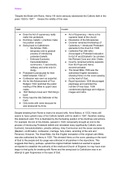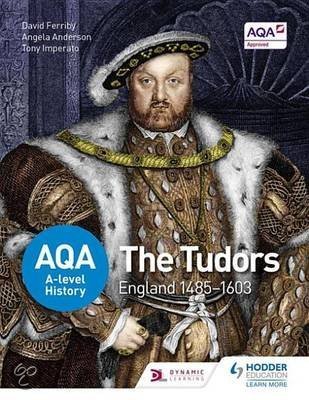History
“Despite the Break with Rome, Henry VIII never seriously abandoned the Catholic faith in the
years 1529 to 1547.” Assess the validity of this view.
Valid Invalid
● Does the Act of supremacy really ● Act of Supremacy - Henry is the
make him protestant. supreme head of the church
● Doctrines, beliefs + practices make ● Dissolution of the Monasteries
his position unclear. ● Cranmer remained Archbishop of
● Swing back to Catholicism: Canterbury + introduced Protestant
○ Six Articles 1539 - elements to the church in 1545.
temporary end to gradual ● Catherine Parr (6th wife)
process of introducing encouraged a Protestant education
protestant beliefs. for Ed VI and Elizabeth I by scholars
○ Enforced Eucharist, like Richard Coxe and John Cheke.
transubstantiation, ● Country remained entirely separate
communion, 7 sacraments, from the Pope and Henry
celibacy and wine only for excommunicated.
clergy ● The Great Bible 1539 was the
● Protestant’s persecuted for their authorised English translation,
belief between 1540-47. showing Henry on the cover passing
● Confession was seen as essential. on the word of God.
● Act for the Advancement of True ● Royal Injunctions 1536 discouraged
Religion 1543 restricted the public pilgrimage and restricted the
reading of the Bible to upper class number of holy days. 1538
males. condemned pilgrimage and religious
● 1537 Bishop’s book and 1543 King’s images and relics.
book
● Henry kept the title Defender of the
Faith
● Only broke with rome because he
was pressured by Anne
Despite breaking from Rome to marry his second wife, Anne Boleyn, in 1533, Henry still
seems to have upheld many of his Catholic beliefs until his death in 1547, therefore making
this statement valid. This is illustrated by the fluctuating position of his doctrines and actions.
For example, the Act of Six Articles, passed in 1539, temporarily brought an end to the
process of introducing Protestant beliefs and reinstated many significantly Catholic ones:
Eucharist, transubstantiation, priestly celibacy, Holy Communion and the seven sacraments
(Baptism, confirmation, confession, marriage, holy orders, anointing of the sick and
Penance). However, The Great Bible, the first English translation of the original Latin Bible,
was also authorised by Henry in 1539. This showed Henry on the cover, passing on the word
of God to the people and its usage was enforced in all parishes in the injunctions. This
suggests that Henry, perhaps, upheld his original Catholic beliefs but wanted to appear
omnipotent to establish the authority of the newfound Church of England, he may have even
begun to feel guilty for breaking with Rome and the swing back to Catholicism was in an
attempt to gain forgiveness in the eyes of God.





